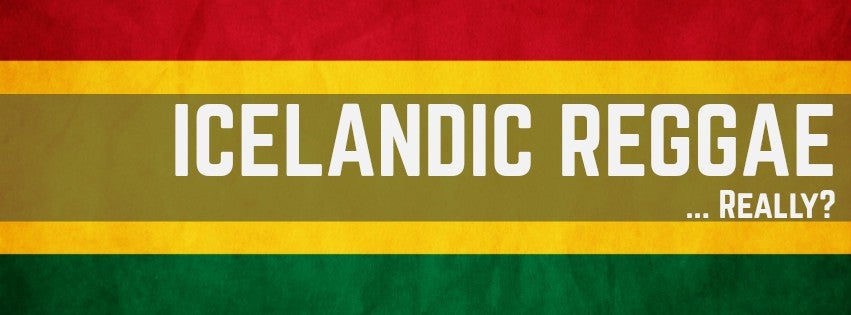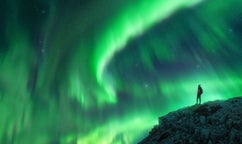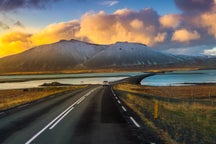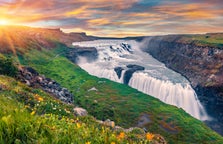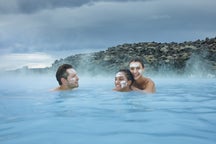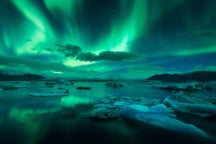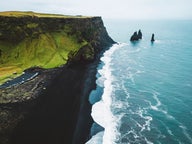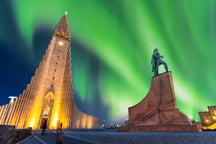For the Philistines out there, Reggae is a style of music widely popularized by such artists as Bob Marley & The Wailers, Peter Tosh, Jimmy Cliff, Black Uhuru, and (dare I be so bold) UB40.
With its skunky roots firmly planted in the Caribbean island of Jamaica, this good-time bassy and repetitive style developed from the 1950s musical discipline, Ska, which also served as a predecessor to Rocksteady and Dancehall.
Why You Can Trust Our Content
Guide to Iceland is the most trusted travel platform in Iceland, helping millions of visitors each year. All our content is written and reviewed by local experts who are deeply familiar with Iceland. You can count on us for accurate, up-to-date, and trustworthy travel advice.
As with much of the music that came and went in the following decade of flower power, Reggae preached peace, unity, collective understanding, and the pleasures of one rather controversial little plant.
Thankfully, the message has lived on, with Reggae, pot, and mutual understanding now more popular than at any given time before.
Of course, there's always the contrarian opinion, but hey... Mi nuh hav nutten fi complain bout, mi life irie.. (English Translation: Nothing to complain about, life is fine.)
And so, without further ado, let's sit back, light up a spliff, give thanks and bless Jah as we explore three exciting groups who have contributed significantly to Iceland's Reggae scene over the years, starting, of course, with Hjálmar.
- See Also: The Björk Saga
Hjálmar
- See Also: Music of Iceland.
Hjálmar has gone through a series of line-up changes since their inception in 2004, but they remain at the forefront of the Icelandic Reggae scene, with a string of acclaimed albums, collaborative projects and audience-favourite singles.
Originally met with skepticism — "Icelanders playing Reggae music? Really?" — the band's early experiments paid off with the enormous success of their debut Hljóðlega af stað (2004), quickly getting the rest of the country on board with this chilled style of off-beat guitars and bassy percussion.
Hljóðlega af stað topped the sales charts in Iceland for over six months and won the outfit two awards at the Icelandic Music Awards, firmly cementing the band as the forefathers of Icelandic Jah.
After their follow up, Hjálmar (2005), the band split temporarily, given the difficulties of having half the band made up of Swedish musicians. Even so, this Nordic brand of Reggae was here to stay and would come to influence Icelandic artists across a range of genres.
Their fourth album, IV (2009), was recorded in the country of the style’s origin, and released alongside a documentary about their time creating music in Kingston, Jamaica.
In the years since, the group collaborated with Jimi Tenor on Dub of Doom (2013), released the career-spanning Skýjaborgin 2004–2014 compilation, returned with the full-length Yfir hafið (2020), and has continued to drop new music, including the single “Morgunóður” in May 2025.
The warmest reggae from the North Atlantic is very much alive.
Ojba Rasta
Ojba Rasta, when pronounced in Icelandic, makes the word 'Ojbarasta!', a tongue-in-cheek exclamation when something in the immediate area is so grim it’s worth remarking on.
Thankfully, this play on words does nothing to describe the happy-go-lucky jams of this 11-person musical outfit, who have been contributing to the Icelandic Reggae scene since their inception in 2009.
Ever since, the band has gone from strength to strength, with a self-titled debut album release in 2012 and a follow-up, Friður, only a year later.
Aside from the official albums, Ojba Rasta has appeared repeatedly at the country’s premier music festival, Iceland Airwaves, and performed at Sónar Reykjavík in 2014. Not bad for a band that includes such eclectic instrumentation as a euphonium, clarinet, melodica, and dub-master, and that’s beside the guitars, heavy bass, and pumping organ.
The band's track "Jolly Good" was listed as the Track of the Month by the English-language newspaper, the Reykjavík Grapevine, in the June 2011 issue. Listen to their live recording of the track for KEXP in 2012:
Whilst still officially together as a band, Ojba Rasta has been quiet for a while on the release front. In that lull, lead singer Teitur Magnússon launched a successful solo career with the acclaimed 27 (2014), followed by Orna (2018) and 33 (2021). He remains an active performer around Iceland.
AmabAdamA
The latest band to hit the Icelandic Reggae scene is the frankly unpronounceable, AmabAdamA. AmabAdamA is a 10-piece band, with members including three singers, a guitarist, bass player, drummer, saxophonist, a trumpet player, a keyboardist (to name only a handful).
Since beginning in 2013, the band members have stuck together to become one of the shining lights of the Reykjavik music scene, famed for their high-energy performances, good vibes and excellent production quality. Standout releases include the summer earworm “Hossa Hossa” (2014) and the album Heyrðu mig nú the same year.
The band's lead singers are Gnúsi Yones, Steinunn Jónsdóttir and Salka Sól Eyfeld, the latter of which is also known for her place in the Icelandic hip-hop group Reykjavíkurdætur ("Daughters of Reykjavík"), as well as her role of Soffía in the Icelandic mystery series, Trapped.
AmabAdamA is signed with the Icelandic record label, Record Records, also known for the wildly popular bands Of Monsters and Men and Agent Fresco.
RVK Soundsystem
The members of RVK Soundsystem are fixtures on Reykjavik’s downtown scene, regularly bringing reggae, dancehall and dub to clubs such as Paloma and to special events across the city.
Consisting of seven local musicians and DJs (in no particular order: DJ Kári, DJ Cyppie, Kalli Youze, DJ Elvar, Arnljótur Sigurðsson, Gnúsi Yones and Teitur Magnússon), seeing the group live is widely considered to be one of the surest bets when looking for an exciting night out on the town.
Though the group still has yet to release an official and collective album, be sure to find a range of their tracks on their Mixcloud and Facebook pages. After all, it's always more satisfying to follow a band before they get big... and you can be sure that RVK Soundsystem will be just that.
Did you enjoy our article on Icelandic Reggae? Who were the favourite artists that you saw during your time in Reykjavik? Make sure to leave your thoughts and queries in the Facebook comments box below.

